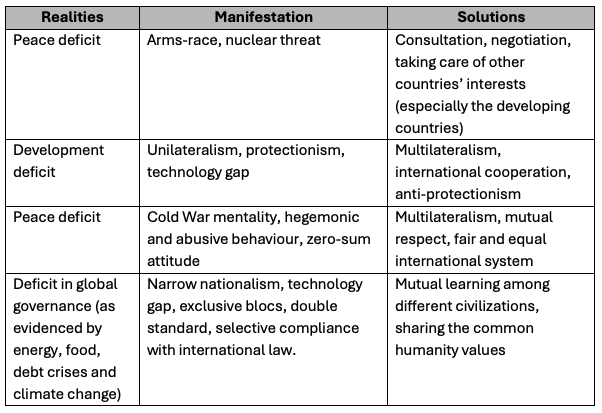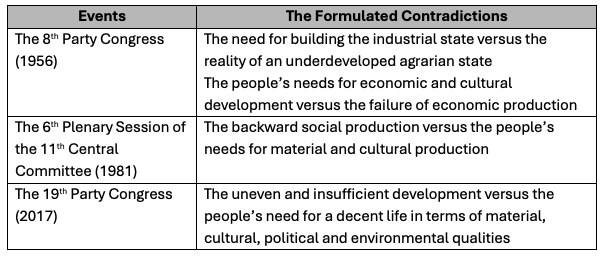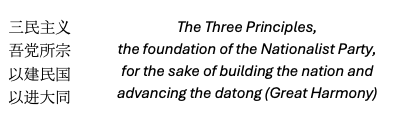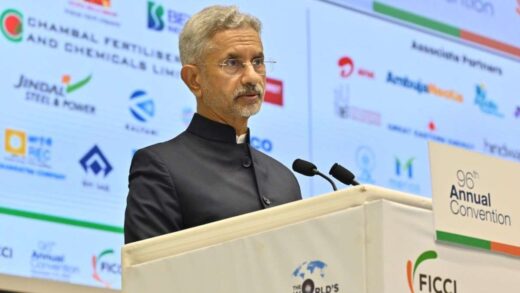This article was shortlisted as a finalist in the 2024 E-International Relations Article Award, sponsored by Edinburgh University Press, Polity, Sage, Bloomsbury and Routledge.
The Community of Shared Future for Mankind has been Xi Jinping’s vision for the future world order. Xi believes that the said world order is already in the making and China leads the process. Therefore, understanding China’s vision for world order is of paramount importance to building peace and development in our region. This article aims to discuss the philosophical underpinning of Xi’s vision and juxtapose it with China’s behaviour.
The Community of Shared Future for Mankind: The Message Behind the Title
President Xi Jinping for the first time mentioned人类命运共同体 (renlei mingyun gongtongti) before the international audience in March 2013 at the Moscow State Institute of International Relations. On several important occasions, Xi Jinping also spoke of 人类命运共同体 (renlei mingyun gongtongti), including in his remarks before the Indonesian parliament in October 2013. Until the first half of 2015, the official English translation for 人类命运共同体 (renlei mingyun gongtongti) was “Community of Shared Destiny for Mankind”. However, since Xi Jinping’s remark at the UN General Assembly in New York on 28 September 2015, the official translation for the phrase becomes “Community of Shared Future for Mankind”. The word “命运 (mingyun)” is translated as “future” instead of “destiny”.
Apparently, by avoiding the word “destiny” Beijing does not want to send an impression of something inevitable for the world. Besides, the word “destiny” could imply China’s giant ambition to lead the world, which may raise concern among other countries. The word “future” sounds more amicable and less revisionist. Nevertheless, there is no adjustment in Chinese official documents for 人类命运共同体 (renlei mingyun gongtongti). Chinese government apologetically uses the word “命运 (mingyun)”. In other words, what is written in Chinese official documents – not the English translation – must be Beijing’s real intention. Therefore analysing the meaning behind the original text cannot be overlooked.
The word 命 (ming) means decree, order or reward from the leaders to their subordinates. It also connotes a life-span or path of life beyond human control. In short, the word 命 (ming) is a property given in the context of power relation and/or moral superiority. Moreover, 运 (yun) means to revolve. It refers to cosmic revolution like seasonal change or the rise and fall of dynasties. In an individual context, 运 (yun) refers to good luck or misfortune. In general, when two words are bundled, 命运 (mingyun) delivers the meaning of mandate, fate and destiny.
Domestic and International Reception
The Community of Shared Future for Mankind (CSFM hereafter) has been one of the key elements of Xi Jinping Thought on Socialism with Chinese Characteristics for a New Era (Xi Jinping Thought) – enshrined in the Chinese Communist Party Constitution in October 2017 and the Constitution of the People’s Republic of China in March 2018. Internationally, Xi Jinping has introduced CSFM in two UN forums. They are the 70th Session of the UN General Assembly in New York (September 2015) and Xi Jinping’s remark before the UN Office in Geneve (January 2017).
China claimed that the CSFM has been widely recognized by the international community. The fact shows that this claim is doubtful. On the occasion of the 75th anniversary of the United Nations in June 2020, six countries i.e. the United States, United Kingdom, Australia, New Zealand, Canada and India rejected the phrase “shared vision of a common future” to be included in the draft of Declaration for the Commemoration of the UN’s 75th Anniversary. The six countries argued that the phrase has been associated with the Chinese Communist Party and Chinese President Xi Jinping’s global vision. Due to the objection, the phrase “shared vision of a common future” was excluded from the declaration eventually.
The Content of CSFM: Reading China’s Proposal and Actions
On 26 September 2023, the State Council of the People’s Republic of China issued a document titled “A Global Community of Shared Future: China’s Proposal and Actions” (China’s Proposal and Actions hereafter). It develops Xi Jinping’s CSFM Proposal as conveyed in the two abovementioned UN forums. In comparison, China’s Proposal and Actions is more systematic as it aims to turn the CSFM into concrete action.
China’s Proposal and Actions begins with a description of the current global situation reaching a crossroads. In the first part, the document underlines the prevalence of instability, uncertainty and deficit trust. The root causes of those phenomena are Cold War mentality, jungle law, hegemonic behaviour and ideological confrontation. In addition to that, it emphasizes the interdependence among nations as the enduring norm throughout history. Hence, a new era needs fresh ideas with future orientation. To fill the gap, China responds to the needs by proposing the ideas that the world lacks.
In the second part, the document offers the ideas to establish global governance based on openness, equality, justice, harmonious coexistence, diversity, cooperation and unity. It strongly criticizes the creation of exclusive blocs, the practice of double-standard and the imposition of hegemony by “certain countries”. Furthermore, China is against the efforts to thwart developing countries from achieving technology. This criticism targets the United States and its allies. China urges the democratization of international relations by giving more voice to developing countries as well as the establishment of fairer and more effective global governance.
The third part demonstrates the continuance of CSFM with Chinese culture and history. It says that Chinese culture stresses harmony as the key concept. Harmony must be realised not only in the domestic but also in the global context. The idea of harmony supposes all nations in the world as one community which pursues justice for the common good (大同 datong, the Great Harmony). This concept of Great Harmony is demonstrated in Beijing’s initiatives such as Belt and Road Initiatives (BRI), Global Security Initiative (GSI), Global Development Initiative (GDI) and Global Civilization Initiative (GCI). In addition to that, the document also shows the compatibility of the concept of Great Harmony in many world different cultures. In other words, China’s Proposal and Actions confirms the acceptance of the Chinese concept by other cultures.
The fourth part shows concrete action toward the realization of CSFM. In this part, China amplifies its criticism towards the Western world. Gone is the era of unilateralism, hegemony, foreign interference, unilateral sanctions and double-standard. China urges new thoughts and ideas to replace the old era. China claims that it does not have a history of aggression, or imperialism towards other nations. China is determined to stay peaceful though it will become the world’s superpower.
The fifth part introduces Beijing’s concrete actions in realizing CSFM. One of them is BRI which connects people and businesses across nations. Then, the global initiatives (GSI, GDI and GCI) are launched to amplify the sense of community in the area of security, development and civilization. China also displays its leadership role during the Covid-19 pandemic. All in all, China aims to demonstrate that CSFM is not an empty concept. It is in the making as evidenced by China’s contribution to the world. The key themes of CSFM is summarized in Table 1: The Highlights of CSFM.
The table above demonstrates that China’s Proposal and Actions is one step ahead of two Xi Jinping’s UN remarks. Undoubtedly, it is more articulate in expressing China’s dissatisfaction with the current international system and more pungent in criticizing Western countries’ attitudes. China’s Proposal and Actions also displays alternative ideas and values as the antithesis of Western norms. Furthermore, it shows that CSFM is already in the making and China has led the process by undertaking its global initiatives.
The Underpinning Political Thoughts
There are at least two main political thoughts that have had a profound impact on Xi Jinping Thought, including the CSFM. First of all, Xi is a diehard Marxist-Leninist. On the occasion of the First Group Study Session of the Political Bureau of the 18th CPC Central Committee on 19 November 2012 Xi reiterated his belief (信仰, xinyang) in Marxism, Socialism and Communism as the political souls of the CPC cadres who enables them to stand tall against all odds. Noteworthily, Xi positions Marxism, Socialism and Communism on equal terms with religious beliefs. On that occasion, Xi said “马克思信仰” (makesi xinyang; Marxist faith) instead of ”马克思主义” (makesi zhuyi, Marxism or Marxist ideology/doctrine). In the Chinese language (信仰, xinyang) refers to religious faith or any supernatural beliefs. In addition, Xi warned his audience of the fate of the Soviet Union in 1991 if they did not have unshakable faith in Marxism-Communism and did not uphold Socialism with Chinese Characteristics. Apart from his Marxist-Leninist faith, Xi also emphasizes his conviction in the pre-eminence of Chinese culture and civilization. He wrote an article in Qiushi Journal on the urgency of researching Chinese history and civilization. By upholding its roots, China shows the world that it is endowed with ancient wisdom and a moral asset to promote the CSFM.
Overall, Xi Jinping’s political underpinning can be summarized in a concept titled “Two Integrations”. The concept of “Two Integrations” was delivered by Xi at a meeting on cultural heritage and development in September 2023. “Two Integrations” means the integration of Marxism into Chinese people’s realities and the integration of Marxism into Chinese traditional culture. Xi believes that “Two Integrations” guarantees the Communist Party’s success in rejuvenating the Chinese nation. Hence, to put things into perspective, CSFM must be read in the context of Marxism and Chinese traditional thought.
Marxism
There are at least several Marxist core concepts that have influenced CSFM: Dialectical Materialism, Anti Hegemonic, The Theory of Contradiction and Historical Inevitability. In the first part, China’s Proposal and Actions narrates human progress from the agricultural era, the industrial revolution to the information revolution. This description is Marxist since it starts from material reality instead of thoughts or ideas. Marx taught that social analysis must begin from material conditions. If Marx’s dialectical materialism begins with the production model in society, China’s Proposal and Actions starts its analysis from hegemonic/exploitative international relations. It indicates global crisis on the prevalence of four deficits (peace, development, security and global governance). These deficits are the consequences of hegemonic relations. The analysis of global conditions in China’s Proposal and Actions is summarised in Table 2: Global Realities and Its Solution.

In comparison to Xi Jinping’s remarks before two UN forums, China’s Proposal and Actions is dominated by anti-hegemony rhetoric. It blatantly identifies the West’s hegemonic behaviour as the root of global crises. The West’s behaviour of unilateralism, cold-war mentality, power abuse, double-standard and hegemonic is the root cause of the chasm between developed and developing nations. As a consequence, the document proposes a solution that is contrary to Western thought and behaviour.
Using the Marxist framework, China’s Proposal and Actions portrays today’s global hegemonic system featured by asymmetrical rivalry among nations in which powerful states can impose their will on weaker states in economy, politics, military, diplomacy and culture. Immanuel Wallerstein, a neo-Marxist scholar argues that a hegemon is a party that imposes global liberalism and the free market. A hegemonic state also interferes in other states’ internal affairs for the sake of its national interest. Moreover, the hegemonic system operates according to capitalist principles in which the world is divided into core states, semi-periphery and periphery states. The core states are those that own technology, capital-intensive industries, and wealth accumulation. In contrast, the periphery states are those that own labour-intensive industries and supply natural resources to the core states. Wallerstein contends that in this system, added values continually flow to the core states, leaving the periphery states at the bottom of the global supply chain perennially.
Though China’s Proposal and Actions does not elaborate on these asymmetrical relations, its message resonates well with its criticism of the global injustice caused by the hegemonic system. In general, CSFM proposes a new system that dethrones Western hegemonic power.
In 1937 Mao Zedong published his writing titled On Contradiction (矛盾论). This writing was meant to apply Marxism according to the Chinese context. In his essay, Mao argues that the law of contradiction is the essence of every material object. It is the foundation of societal development and it occurs in a specific context. Furthermore, Mao elaborates on types of contradiction: antagonistic (not universal) and non-antagonistic (universal) as well as primary and secondary. In a capitalistic society, antagonistic contradiction takes place between the capitalists (exploiter) and the proletariats (exploited). The solution to this contradiction is the proletariat revolution. Antagonistic contradiction may change into non-antagonistic and vice versa. For instance, the antagonistic contradiction in the capitalistic society in the Republic of China era occurred between the Nationalist Party (Guomindang) which represented the capitalists and the Communist Party which represented the proletariats. This antagonistic contradiction (primary) became non-antagonistic (secondary) due to their cooperation in resisting Japanese aggression in 1937-1945.
In 75 years of its history, the People’s Republic of China has formulated three main contradictions which are based on people’s needs and the production supply. The contradictions are summarized in Table 3: Three Main Contradictions in the History of the People’s Republic of China.

Though it is not explicitly stated in China’s Proposal and Actions, one can infer that the contradiction in the CSFM occurs between the global hegemonic system featured by multi-dimensional crises vis-à-vis human needs for an interdependent global community which upholds inclusivity, equality, justice, harmony, pluralism and cooperation.
Marx and Engels claimed that the socialist revolution would inevitably topple capitalism. By using the word 命运 (mingyun, destiny)as explained above, does CSFM convey the same message of historical inevitability as believed by Marx and Engels? Does Xi Jinping believe that the world is en route to a global community? Or does he merely propose a roadmap for a world order in the future?
The paper argues that both Marxism and CSFM based their inevitability on the rationality of the concept. Marx and Engels believed that socialism would inevitably dethrone capitalism because rationally, capitalism is self-defeating. The self-alienation in the production process is dehumanization, therefore on the edge of history, humans will return to their social nature (communism). According to Marx, communism is not a moral guidance, it is the essence of humanity. It also resonated well Lenin’s conviction that all forms of capitalism, including imperialism and hegemony will eventually rot due to its parasitic nature. In the same manner, Xi Jinping believes that CSFM is by the course of history. The current hegemonic system is unfair and doomed to fail. Gone is the era of hegemony, zero-sum attitude and ideological rivalry. Mankind desires a global community featuring justice, equality and common prosperity. Those who fight for this purpose are on the right side of history.
Traditional Chinese Thought
Xi Jinping’s vision of the world as a community has its roots in Chinese traditional thought of 大同 (datong, the great harmony/the great union). China’s Proposal and Actions mentions harmony as the key concept of Chinese culture that pursues solidarity, mutual progress in diversity and global harmony (天下大同). China’s Proposal and Actions also states that the Chinese believe the human race is one global community. In this era, the will of mankind is directed toward one family. CSFM is proposed precisely amid the human need for a vision of unity that accommodates the course of history. This section discusses the aspects of datong that profoundly impact the CSFM.
大同 (datong) appeared for the first time in the seventh chapter of 礼记 (liji, the ritual notes). Liji was a manual guide for Confucian ethics compiled in the third to the second century before Christ. Confucianist scholar who developed the thought of datong is Kang Youwei (1858-1927) in his book “On the Great Harmony” (大同书, datongshu). Kang’s vision is to abolish private ownership and classes within the society and the country. Kang believes that Confucian benevolence (仁, ren) must not be restricted to certain social groups. According to his reading on Confucianism, Kang was against uneven wealth distribution in society. He attributed this social phenomenon to selfishness and greediness. Kang suggested removing societal partitions, including the familial boundary to fully implement Confucian benevolence (仁, ren) in all aspects of the society.
大同 (datong) is the Chinese concept of bonum commune. It is an ideal version of domestic and global society. 大同 (datong) is the advanced version of 小康 (xiaokang) – a basic level of socialism as coined by Deng Xiaoping. According to traditional Chinese thought, in xiaokang society the aristocratic families and capitalists still maintain property ownership from generation to generation. Whereas in datong society there is no spirit of selfish wealth accumulation by certain groups of clans. All boundaries must be abolished to implement Confucian benevolence (仁, ren). Properties and professional jobs must be dedicated to public affairs. Kang contends that Confucian benevolence (仁, ren) must develop and propagate from the familial circle to all humanity and even the whole creation. 大同 (datong) embraced by CSFM is a community of all nations that promotes common prosperity without hegemony and oppression.
In the early years of modern China after the fall of the Qing Dynasty in 1911, the vision of datong became a popular political concept. Sun Yatsen adopted the vision of datong as an ideal society as shown in the national anthem of the Republic of China 三民主义 (sanmin zhuyi, the three principles):

Whereas among the early Chinese communists, datong is used to introduce communism to Chinese society. The prominent figure of this project is Li Dazhao (1889-1927) known as the first Chinese Marxist. According to Li, socialism is a synthesis of Marxism and Chinese traditional thought. He suggested that a socialist society embodies these certain characters: (1) production force will be owned and dominated by the society, not certain individuals or groups; (2) economy will be ruled to develop humanity instead of profit accumulation; (3) justice is realised in even wealth distribution and opportunities; (4) the society needs an institution which execute the will of the people; (5) the state will provide social insurance for the poor and vulnerable groups; (6) individuals will develop their capacity for common good instead of personal benefit. In short, Li believes that datong can be manifested in society by following the Marxist precept, i.e. control of production forces by the society.
Just like Kang Youwei, Li Dazhao positions China in the global context and elaborates on China’s role – as one of the oldest civilizations – in shaping the world’s future. Li contends that the improvement of world structure is a condition for human liberation. Therefore the struggle for emancipation against exploitation must be conducted in the global context. Li urged China to cooperate with other nations and participate in the global struggle to achieve international proletariat. Xi Jinping subscribes to Li Dazhao’s elaboration of China’s global role. Li believed that China must play the role of supporting the course of history toward socialism. Correspondingly, Xi perceives that China must play the key role in building a human community which is fair and anti-hegemony.
CSFM: Between Rhetoric and Reality
In the last part of the State Council document, China shows its concrete actions and initiatives to build a community of shared future. Nevertheless, China’s behaviour is essential in deciding if CSFM is going to be an international norm. There are at least three factors to assess Beijing’s consistency with its proposal. In China’s Proposal and Action, Beijing condemns hegemony and urges all countries to maintain the world order based on international law. China denounces double standards behaviour and selective compliance with international law. However, how China defends its own behaviour in the South China Sea. China’s claim in the South China Sea cannot be reconciled with the 1982 UNCLOS even though it has ratified the Convention. Furthermore, Beijing has shunned the UNCLOS Tribunal ruling that invalidates its claim and behaviour in the South China Sea. This fact underlines that China itself also practices double standards and selective compliance with international law.
CSFM as well as the Global Security Initiative promotes political dialogue and consultation as the sole mechanism for dispute resolution. Apparently, China aims to avoid international law mechanisms. Unlike the international law mechanisms, political dialogue and consultation entail asymmetrical power among the participants. In the case of the South China Sea dispute, for instance, China proposes bilateral negotiation with other claimant states which are militarily and economically weaker. Therefore, on the bilateral consultation, China and other claimant states are not on an equal footing. Dialogue and consultation are indeed important in international relations. However, only promoting these in the security issues and excluding other mechanisms is against the spirit of fairness and equality.
China’s Proposal and Actions upholds the spirit of equality, mutual respect and mutual learning among different civilizations. It also underlines that no country can claim superiority over others. However, Beijing is keen on stressing itself as one of the world’s oldest civilizations that possesses moral assets to lead the world. This attitude seems to contravene the spirit of equality. In its South China Sea narrative, Beijing claims that the Sea has been Chinese domain since “time immemorial”. This claim is groundless according to modern international law. Surely, China implies superiority over other countries by stressing its older civilization. On the other hand, China’s Proposal and Action rejects uniformity in applying democracy. It said, “Democracy is not Coca-Cola, tasting the same across the world as the syrup is produced in one single country”. Beijing claims the universality of CSFM aspiration and keeps relativizing Western values.
Conclusion
CSFM is Beijing’s proposal to fill the gap in the contradiction between two conditions. First is the global situation suffering from multi-dimensional crises due to Western power’s hegemonic behaviour. Second is the strong tendency of humanity in this era to build a global community. It is precisely under this condition, that CSFM proposes a community for mankind which upholds equality, justice, harmony, diversity, cooperation and unity. Marxism and Chinese traditional thought are profoundly embedded in the CSFM. The two thoughts are Xi Jinping’s guidance in formulating domestic and foreign policies. On one side, Marxism is the soul and the raison d’etre of the Chinese Communist Party. On the flip side, upholding Chinese traditional thought has become the source of moral legitimacy for the Communist Party to rule the nation. Whether the CSFM will materialize as the vision of world order depends on Beijing’s consistency with its rhetoric. This paper argues that China’s behaviour is not fully in line with the CSFM. Particularly, in the issue of compliance with international law and equality among different civilizations. Only if China backs its words with deeds can the CSFM enjoy wider acceptance.
Further Reading on E-International Relations
Source link
#Deciphering #Jinpings #Community #Shared #Future #Mankind


















